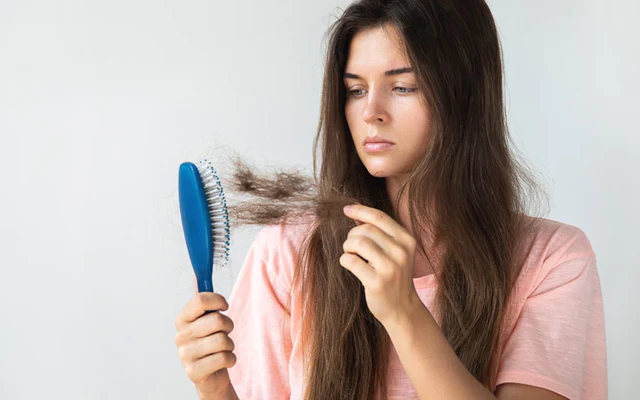Millions of women are affected by Polycystic Ovarian Syndrome (PCOS). And one of the symptoms associated with PCOS is indeed hair loss. So PCOS does actually lead to hair loss. It is not uncommon to find a woman seeking a PCOS specialist London appointment due to this hair loss symptom. Here, we set out to explain why PCOS leads to hair loss and whether it is possible to stop hair loss due to PCOS. We shall also explore the various treatment options that are available to address the hair loss that PCOS causes.
Introduction to PCOS
PCOS is a hormonal disorder that causes women’s ovaries to become larger and to have small cysts on the edges. Women who have PCOS tend to have higher than normal levels of male reproductive hormones in their bodies. Those male reproductive hormones are otherwise known as androgens. And when women have too much of them, there can be problems such as menstrual cycle irregularity, acne and infertility.
PCOS also has a tendency to alter hair growth patterns in women in certain ways. It may cause the hair to grow where it isn’t supposed to (a condition we refer to as hirsutism). And it can also cause loss of hair in certain parts. Both scenarios can be alarming:
Our focus here is on the scenario where PCOS leads to loss of hair. This tends to take the form of what we refer to as Female Pattern Hair Loss (FPHL). So this is a case where women tend to have the hair at the top of their heads thinning out. However, unlike the case with male baldness, in this case, the hairline is usually not very much affected.
Why does PCOS lead to hair loss?
PCOS causes women to have higher than normal levels of male reproductive hormones (androgens) in their bodies. It is these higher-than-normal levels of male reproductive hormones that in turn lead to hair loss.
To make sense of the whole thing, it is important to appreciate that hair grows in two phases. The first one is what we simply refer to as the growth phase. It is normally a long phase, going on for between 2 and 6 years. During this phase, the strands that make up the hair actually increase in length. The second one is what we refer to as the rest phase. This is much shorter in terms of duration – lasting around 3 months. So this is a phase at the end of which there is shedding of hair.
Now what happens when a woman has female pattern hair loss is the shortening of their hair’s growth phase. This ultimately leads to more shedding of the hair, which is what manifests as hair loss.
Here, it is important to point out that the hair loss symptom does not occur in all women suffering from PCOS. But in those whom it does affect, it can cause some high degree of distress. As noted earlier,
Is it possible to stop PCOS hair loss?
As we have seen so far, PCOS hair loss is due to underlying complex hormonal imbalances. Therefore there are certain things that one can do to directly or indirectly stop hair loss.
Here, it is important to point out that PCOS is not the only cause of female pattern hair loss. There are other possible causes, such as what we refer to as traction alopecia and trichotillomania. When a person is losing hair due to those, and you add PCOS on top, the total hair loss can be huge. Thankfully, the hair loss that is due to these other factors tends to be much easier to control. And if you can eliminate the hair loss that is due to those other factors, then hair loss due to PCOS may not be so noticeable.
Therefore one thing you can do is avoid hairstyles that entail pulling the hair too much. Also, avoid hair treatments that tend to lead to hair loss. So here, you would be trying to minimize the hair loss that is due to other causes. This way, you’d remain only with the hair loss that is due to PCOS.
As for directly stopping PCOS hair loss, that too is doable to a certain degree through some medical measures. We shall be looking at those shortly.
Is it possible for hair that is lost due to PCOS to regrow?
In some cases, hair that is lost due to PCOS may be made to regrow. There are treatments that can make this possible. But they are certainly not perfect, and therefore it may not be possible to restore the hair exactly to the pre-PCOS state.
Medical treatments for PCOS hair loss
The medical treatments that can address PCOS hair loss include:
● Oral contraceptives (which try to address the underlying hormonal imbalances)
● The medication known as spironolactone
● The medication known as minoxidil
● The drugs called Finasteride and dutasteride
● Transplantation of hair
Home remedies for PCOS hair loss
These include things like:
● Zinc
● Biotin and
● Weight loss
Taking the example of something like weight loss, here is how it works. When a woman with PCOS loses weight, there may be some decline in the male reproductive hormones in her body. That is what would in turn address some of the PCOS symptoms, such as hair loss.
Other measures such as the use of zinc and biotin are best undertaken under a doctor’s guidance. That is because such things (like zinc and biotin) can interfere with other medications one may be taking, among other issues.
PCOS hair loss: How you can make it less noticeable
One strategy that works well is of styling the hair in ways that somewhat conceal the loss.
Another viable strategy is that of using coverings like scarves, hats and wigs to conceal the loss. It is actually the sort of thing that can make a woman to urgently make a private GP appointment London booking.
